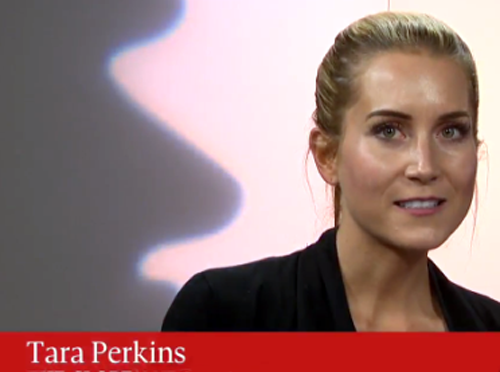
Chicago, 2005: Tara Perkins, working as a reporter for the Canadian Press, has been asked to get an audio clip of Conrad Black, who was on trial for fraud.
“We weren’t permitted to record in the courtroom, and I didn’t know if it would be very difficult to catch him outside of the court,” she says. “So I was waiting outside, and I saw Black and his lawyers get out of the car and hurry to the elevator in an office building up the street.” Catching up to them, Perkins stuck her arm holding the microphone between the closing elevator doors as she shouted her request for a comment from Black – and he replied.
“His response was, ‘Always great to be back in Chicago,’” says Perkins. Nothing earth-shattering, but something that could be used on the radio, and an example of the need for persistent determination in a journalist’s life.
Covering the Conrad Black case was fascinating in many ways, she adds. “It was a complete media circus, and I learned that the British media are incredibly aggressive, even more than the American media. I was also interested in the differences between the Canadian and American justice systems. For example, at the end of Black’s trial we were actually able to track down the jurors and interview them about what happened in the jury room during deliberations. That does not happen in Canada.”
Today, Perkins is a business reporter at the Globe and Mail, and has recently moved from writing about banking and financial services to focusing on real estate.
Born in Edmonton, Perkins grew up in Oakville, Ont. She had always seen herself working in the business world, so she studied industrial economics at the University of Guelph. In her final year, however, she met a Reader’s Digest editor who sparked her interest in journalism. To try it out, Perkins wrote a few articles for the Ontarion, U of G’s student newspaper, and realized that this was what she wanted to do.
After graduation she earned a post-graduate degree in journalism at Ryerson. “While a student at Ryerson, I spent one summer interning with the Kitchener-Waterloo Record and did a placement at the Globe and Mail.” The Globe and Mail then hired her as the overnight website editor.
“The hours were brutal – 11 p.m. to 7 a.m. I lived on coffee,” she says. “Then I got a full-time gig at the Hamilton Spectator doing business reporting, and a year later Canadian Press recruited me. A few years later, the Globe and Mail asked me to come back – to work during the day this time – and now I’ve been there seven years.”
Perkins adds that the combination of a solid business degree with her journalism training was very helpful. “There are many people who want to write about sports or entertainment,” she says, “but not as many with the background to write well about business. I am not sure I would have gotten full-time work without it.”
Her Chicago foray to report on Conrad Black’s trial and sentencing was one career highlight, but her work has given her the opportunity to meet many well-known people in business and politics. “I had lunches with Paul Martin and with Jim Flaherty, and wrote about them in our weekly column called ‘The Lunch,’” she says. She’s also proud of the time she questioned prime minister Stephen Harper after one of his speeches, even though his PR people had turned down her request for an interview. “His PR people were not happy, but he answered my question, and I got it in a story for the next day.”
Perkins says the newspaper industry has changed considerably since she was studying journalism. “Today the website has priority over print,” she says. “That’s made it a 24-hour-a-day business. I’ll be up at 5 a.m. to revise a story sometimes. Now journalists who used to just write are increasingly asked to do videos. Multimedia skills have become essential. I can’t even imagine what this field will be like in another five or 10 years.”
Fortunately, one of the things Perkins likes best about journalism is the opportunity to try new approaches, learn new things and have variety in her work. And some important things do stay the same, she adds. “The basic skills of research and telling the story haven’t changed.”
Perkins describes herself as having been very shy, quiet and bookish in high school – and curling up with a good book is still one of her favourite things to do. “Journalism really brought me out of my shell. If you are a writer in the bookish sense, journalism might not be right for you because it is very social. You need to be out and talking to people all the time.”